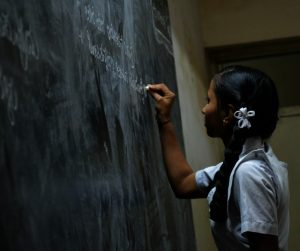Differences Between Education And Schooling: The two terms education and schooling are generally used in relation to the modern day state and process of formal and or informal knowledge acquisition. They are rather mostly used in relation to formal acquisition of knowledge. The two concepts are closely related and may be correctly used interchangeably.

Recommended: Differences between Being smart and intelligent
Meaning of Education
Education is the process of imparting knowledge, skill and judgment via academic institutions and otherwise. Education includes facts, skills, beliefs and ideas that have been learned, either formally or informally. Education is an opportunity for one to be particularly trained, instructed or be taught on a particular field, subject or general discourse. Education connotes depth and intensified knowledge.

Although status of being educated can be acquired subconsciously and maybe unconsciously, education particularly relates to conscious acquisition of knowledge and skill. Thus, when a person is said to be educated, it generally implies having had a formal learning in respect of a particular field. Education is regarded as a two way power for it places an educated person at an advantage against one who is not. Upon being educated, one acquires credential in the form of qualifications and labels which helps in securing a job and proper representation of the field so educated on.
Education is a stepping stone and it is structured as such. Passing through a stage of education qualifies one to enroll for another and get more informed in a higher level. Education keeps the mind engaged. It makes one to see the world in a different and from clearer perspective.
Through education, hope, exposition, confidence, value, resources and opportunities are acquired. Education setting may be formal or informal. In an informal education, formalities are not observed. They are part of experiences acquired through day to day activities and experiences. The source through which the knowledge and experiences are acquired could be from the company of friends, relatives and the society at large.

Recommended: Countries with the best education system in the world 2022
Informal education has no predetermined aims. There are also no prescribed rules and regulations. It follows therefore that all experiences and knowledge acquired outside a defined school system may qualify as informal education. This includes those acquired subconsciously and consciously. People may get informed by engaging in personal research and development. This too qualifies as an informal education. Methods of acquiring formal education include imitation, role play, apprenticeship, storytelling, personal research, etc.
What clearly distinguishes informal education from formal one is that for formal education, there is a structured curriculum to be operated within a structured setting and there are rules and regulations, specially trained teachers to instruct and supervise the learners, and certificate and recognitions upon completion of the process. The time frame for the completion of a formal education is fixed or determinable. Informal education on the other may never end.
The similarity between both forms is that both are means through which knowledge and skill are imparted. They both guarantee deviation in attitude and perception of the learner. Inasmuch as formal education has become a trend and has dominated over informal education, the relevance of informal education cannot still be questioned. It still plays foundational and advanced role in the development of individuals and the society.
Recommended: Countries with the most valued currency in the world
Meaning of Schooling
Schooling is an institutional education. In its verb form, it is the act of training or getting trained in an academic institution. The term schooling is also particularly used in reference to the attendance of school. It is from the noun, ‘school’ which means an educational institution dedicated to teaching and learning. It follows therefore that schooling related to training or education had in school. Schooling can also be used in a loose sense to imply getting someone informed in an informal setting. Example in sentence; Allow me to school you on the act of cooking.

Recommended: Advantages and Disadvantages of being a Teacher
Differences Between Education and Schooling
From the analysis of the two concepts, ‘education’ and ‘schooling’, it is seen that both are so closely related that people do not mind using them in place of each other, as long as they are aptly used in the particular context. However, their differences occupy a thin line on which they can be vividly distinguished.
1. Education is clearly of two forms; formal and informal education. On the other hand, informality is used for schooling only in a much loose sense. Schooling rather involves stages of acquiring formal education starting from primary, secondary and tertiary level. Schooling clearly can only be of one form which is formal schooling.
2. Inasmuch as education and schooling may convey a similar meaning, the term education is wider in scope and deeper in meaning whereas schooling when used conveys a narrower and specific sense of education.
3. Schooling is particularly a formal form of education. It follows therefore that schooling is always formal; it is training, instruction, ideas and knowledge being learned in a recognized systematic setting. On the other hand, education can be informal.
Therefore, it may extend to other forms of acquiring and imparting knowledge not being within a defined and formal school system. This too justifies the assertion that education is wider in scope. Education can be had at anywhere and at anytime; schooling can only be had in school.
Also see: Roles and Responsibilities of a Teacher
4. Schooling lasts for a fixed or determinable period of time. For instance, schooling in a university may take four to six academic years afte5r which that particular chapter becomes completed, all things being equal. But in the case of education, it relates to the totality of one’s academic journey from the least level to the uppermost.
It also extends to experiences informally acquired (that is, acquired in an unofficial school setting). Thereof, education is continuing. There is no determinable period of time for the completion of education in general because advanced studies as well as informal learning can further be obtained.
Also see: How to network as a student
5. Primarily, during schooling, although students may learn by themselves to an extent, they are being taught and guided specifically, whereas for informal education, there need not be teachers or instructors; there necessarily need not be monetary payment. Where the education is informal, learners can be self-taught. When people make personal researches, they are simply advancing education and personal development though by informal means.
6. Schooling particularly equips students with ideas, experiences, knowledge, morals, skills, facts and theories, and so on. All these impacts comes from schooling simpliciter, but it wears the garb of education which connotes a deeper effect only when the information so acquired from schooling is applies to solve problems in the society and effect changes in personal perceptions and attributes. An educated person has the capacity to apply ideas learnt from school to real life problems. Schooling does not necessarily guarantee this, but it is a boost and a foundation to quality education.
7. One need not have to have attended the four walls of a school in order to become educated. On the other hand however, schooling involves particularly having attended the four walls of a school and to be complete, must have acquired the incidental certificates or degrees attesting one to have been to school.
8. Schooling is the foundational basis of formal education, whereas education connotes a long term or life-long acquisition.
Recommended: Countries with the Worst Education Systems In The World
Conclusion
Schooling is a formal means through which education is acquired. It follows correctly therefore that one can be schooled without actually getting educated. Education therefore connotes a deeper context of schooling; it is a continuing state and has more of a practical relevance than mere certificates from schooling.

Edeh Samuel Chukwuemeka, ACMC, is a lawyer and a certified mediator/conciliator in Nigeria. He is also a developer with knowledge in various programming languages. Samuel is determined to leverage his skills in technology, SEO, and legal practice to revolutionize the legal profession worldwide by creating web and mobile applications that simplify legal research. Sam is also passionate about educating and providing valuable information to people.